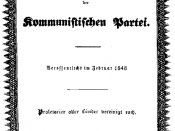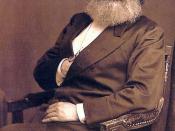The ideas of Karl Marx
Karl Marx was one of the most important thinkers of Western civilization. For good or for ill, few individuals have had as profound an effect on the course of history as Karl Marx. Marx was a highly original thinker: like many original thinkers, he expressed many intelligent ideas and a considerable amount of nonsense. It is impossible, in one assignment, to do justice to anything as complex (and contradictory) as Marx's thought. What follows is a brief summary of what Marx was trying to say. You should be aware that Karl Marx would not necessarily approve of everything that is done in the name of "Marxism" in the Communist world.
1. The economic theory of history
Marx's view was that economics determined human history. This economic theory of history held that men's economic needs and the techniques by which they meet these needs determine the course of history.
As Engels put it: "Marx discovered the fact, hithertofore unnoticed, that men must eat, wear clothing, and find shelter before they are interested in religion, philosophy, art, or nationality." In a society of nomads, Marx pointed out, political power rests with those who own the most horses. Similarly, in a modern industrial state, Marx argued that political power rests with those who control the factors of production (factories, mines, railroads, labor, etc.). This is the most important difference between liberal and Marxist opinion. Marxists believe that, no matter what political institutions exist, there can be no freedom for the great mass of people as long as economic control is in a few hands. Liberals disagree, stating that freedom for the individual requires that the individual have the right to hold economic power in his own hands and (within reason) use that power as he sees...



Charming
Good job Samk17. Karl Marx, was one of the greats for social change. Very well paper. Keep up the ambition.
4 out of 4 people found this comment useful.